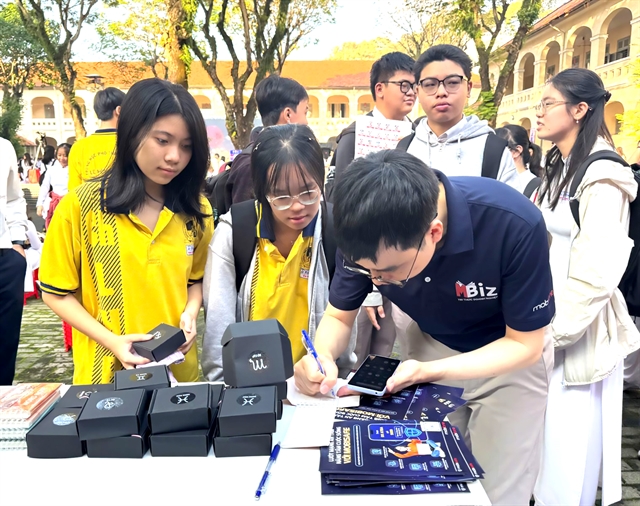 Society
Society

 |
| Students at Lê Hồng Phong High School for the Gifted in HCM City learn about a new technology app. — Photos baotintuc.vn |
HÀ NỘI — Artificial intelligence (AI) is fast becoming the teacher’s new assistant in Việt Nam’s classrooms, from secondary schools to university lecture halls, where the technology is opening fresh possibilities for teaching and learning.
Yet for AI to truly drive progress, the education sector must move from awareness to action — from understanding AI to mastering it in a humane and sustainable way.
Shaping digital learning
AI is now an indispensable tool across all sectors, particularly education. Once a means of storing and transmitting knowledge, it can now analyse, advise and personalise learning pathways for individual students.
Associate Professor Dr Nguyễn Xuân Hoàn, Rector of the University of Industry in HCM City, said this marks an opportunity for Việt Nam to shift from traditional to smart education — one where learning paths are tailored to each student’s abilities, interests and career orientation.
At the policy level, the Politburo's Resolution No 71-NQ/TW identifies the task of comprehensive digital transformation and universal application of digital technology and artificial intelligence in education and training. This is not only a strategic direction but also an urgent requirement as the global labour market moves rapidly toward a knowledge-based economy.
According to Dr Lê Thị Mai Hoa, Deputy Director of the Education Department under the Central Commission for Communications and Mass Mobilisation, Việt Nam allocates at least 20 per cent of the State budget to education and training, including a minimum of 5 per cent for development investment. These resources aim to modernise infrastructure, technology and innovation capacity.
To harness AI effectively, she said, Việt Nam must build a 'dynamic link' connecting the State, schools, enterprises and technology partners, with AI serving as the 'central nervous system' linking knowledge to the labour market.
AI from the start
At the general education level, pioneering schools such as Lê Hồng Phong High School for the Gifted in HCM City are leading the way. The school has introduced AI into its curriculum for seven years, offering three levels of engagement — basic, applied and specialised research.
“Early exposure not only helps students understand technology but, more importantly, nurtures creative thinking and adaptability for the future,” headmistress Phạm Thị Bé Hiền told Tin Tức và Dân Tộc (News and Ethnic Affairs) newspaper.
However, a key challenge remains the shortage of teachers with proper AI training. “We have to contract AI lecturers and engineers while providing in-depth training for Informatics teachers to ensure teaching quality,” she said.
This reflects an urgent need for policies to strengthen teachers’ digital competence, a critical foundation for Việt Nam’s entry into the new education era.
At the university level, institutions like the University of Industry in HCM City are investing heavily in digital transformation, from technology infrastructure to management systems. Yet, as Dr Hoàn noted, the lack of shared data and software platforms reduces efficiency.
“We need a unified database for universities to avoid fragmented development and resource waste,” he said.
 |
| Students at the HCM City University of Technology, Việt Nam National University-HCM City, during a laboratory session researching biotechnology applications. |
Ethics at the core
If AI is seen as the 'brain' of future education, ethics must be its heart, ensuring sustainable and humane development.
Associate Professor Dr Nguyễn Văn Vũ, Deputy Head of the Faculty of Information Technology at the University of Science under the Việt Nam National University - Hồ Chí Minh City, said: “The question is no longer whether we should use AI in education, but how to use it properly and humanely.”
AI can support teachers in grading, career counselling and content creation. But without ethical safeguards, biases in data or algorithms could create unfair outcomes for learners.
Việt Nam, he said, should soon establish an AI ethics framework for education to ensure transparency, fairness and humanity in its applications.
Dr Hoa outlined six priorities for integrating AI into education. These include developing a national AI literacy curriculum for both teachers and students and strengthening digital and ethical training for educators.
She emphasised the need to integrate AI into STEM subjects rather than treating it as a separate discipline while also establishing regulations on academic integrity and the use of AI in teaching and research.
She also highlighted the importance of developing Vietnamese-language AI platforms and digital infrastructure and promoting public awareness and a culture of innovation among both teachers and learners.
Professor Dr Lê Anh Vinh, Director of the Việt Nam Institute of Educational Sciences, agreed that consistent policy, flexible curricula and regular updates are essential. Teacher training and open-access Vietnamese-language learning resources, he added, will help narrow regional disparities.
Huỳnh Thành Đạt, Deputy Head of the Central Commission for Communications and Mass Mobilisation, said there is a need to soon introduce both an AI Competency Framework and an AI Ethics Framework for schools. He also proposed establishing a Digital Transformation Fund for higher education to attract private investment and support pioneering institutions.
“Enterprises, too, must change their mindset — from being mere employers to co-creators of future human resources,” he said. — VNS